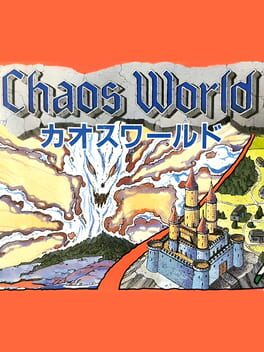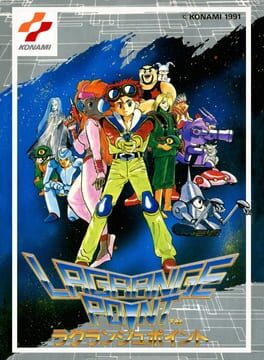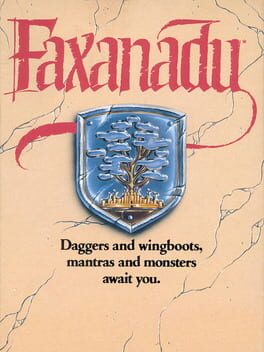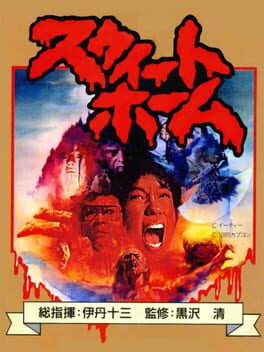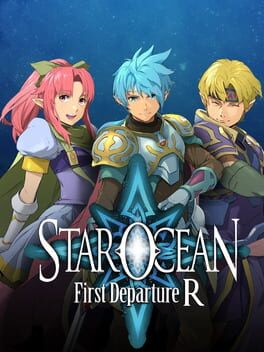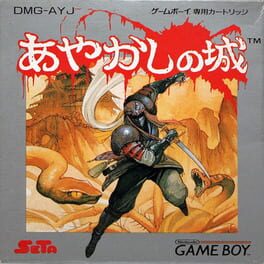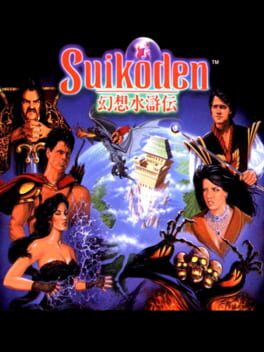Martic
1991
Modern Gamers' Guide to 8-Bit RPGs #5 - Chaos World
I bumped up my rating of Lagrange Point after playing this because, to me, Chaos World is the very definition of mediocrity.
There's very little separating this from the likes of Dragon Quest I or Final Fantasy I. High encounter rate turn-based battles (actually, it's not even really turn based. You press "Fight" and the game auto battles based on your chosen strategy preset), an overworld map that gradually opens up, a few maze-like dungeons . . . Your party is even referred to as the Warriors of Light and the big bad is named Chaos, for crying out loud!
Perhaps the only worthwhile difference to mention is that you have a total of 16 recruitable party members--most of whom will spend the remainder of their days getting plastered in the bar you leave them in. Once you have a party of 4 there's very little reason to change them out. There's a replayability factor thanks to the 8 different classes your party can be comprised of, but the Thief and Shaman classes are woefully lacking in late-game weapons and, let's be honest here, you're unlikely to want to replay this anyways.
My Enjoyment - 4/8 Bits. Chaos World is a mundane RPG that came out 5 years after Dragon Quest I and did little to evolve that game's formula. If fast-forwarding wasn't available to me I highly doubt I would have finished it.
Difficulty - 3/8 Bits. Grind up around a town with a cheap inn every once in awhile and you'll be fine.
Modern Accessibility - 3/8 Bits. Your mileage will vary depending on how much you can stomach random battles that, in this case literally, play themselves. There are also no in-game maps so you'll be relying on memory or shuffling through various maps online.
Final Verdict - Modern gamers need not apply. While I didn't outright hate my time with this game, I didn't really enjoy it either. It's a very safe entry in the JRPG timeline by developer Natsume. I love quite a few of Natsume's later games but this one ain't it chief.
I bumped up my rating of Lagrange Point after playing this because, to me, Chaos World is the very definition of mediocrity.
There's very little separating this from the likes of Dragon Quest I or Final Fantasy I. High encounter rate turn-based battles (actually, it's not even really turn based. You press "Fight" and the game auto battles based on your chosen strategy preset), an overworld map that gradually opens up, a few maze-like dungeons . . . Your party is even referred to as the Warriors of Light and the big bad is named Chaos, for crying out loud!
Perhaps the only worthwhile difference to mention is that you have a total of 16 recruitable party members--most of whom will spend the remainder of their days getting plastered in the bar you leave them in. Once you have a party of 4 there's very little reason to change them out. There's a replayability factor thanks to the 8 different classes your party can be comprised of, but the Thief and Shaman classes are woefully lacking in late-game weapons and, let's be honest here, you're unlikely to want to replay this anyways.
My Enjoyment - 4/8 Bits. Chaos World is a mundane RPG that came out 5 years after Dragon Quest I and did little to evolve that game's formula. If fast-forwarding wasn't available to me I highly doubt I would have finished it.
Difficulty - 3/8 Bits. Grind up around a town with a cheap inn every once in awhile and you'll be fine.
Modern Accessibility - 3/8 Bits. Your mileage will vary depending on how much you can stomach random battles that, in this case literally, play themselves. There are also no in-game maps so you'll be relying on memory or shuffling through various maps online.
Final Verdict - Modern gamers need not apply. While I didn't outright hate my time with this game, I didn't really enjoy it either. It's a very safe entry in the JRPG timeline by developer Natsume. I love quite a few of Natsume's later games but this one ain't it chief.
1991
Modern Gamers' Guide to 8-Bit RPGs #1 - Lagrange Point
Barring one dramatically shocking pre-rendered cutscene, only die-hard old school RPG will enjoy travelling back in time to the Lagrange Point.
There are also 4 "overworld" areas to explore which, while impressively sized for the time, quickly become a chore to explore and constantly backtrack through thanks to the 2-10 step encounter rate.
Battles are a turn-based affair revolving primarily around basic attacks and buffs/debuffs. Each party member has a a signature special move they can use, but these moves cost 1/2 of that character's Maximum HP value. Thanks to the high encounter rate and all basic attacks pulling from the same BP (read: MP) pool as your healing abilities, special abilities are rarely worth the cost outside of boss battles. Speaking of boss battles, they almost all come in the form of invisible encounters that you're likely to walk into without warning. If you're caught off-guard while low on resources, expect to watch your party fall.
Luckily death won't completely set you back. If you die you lose your temporary money, but your character growth and items are retained. (Temporary money is money earned after a battle. To keep your cash you have to bank it in a town. If you die before doing so you lose every cent of your battle earnings since your last visit to town.)
Before I wrap the review there are a few cool features I want to breeze through. There's a basic weapon fusion system that manages to feel ahead of its time thanks to a consistent upgrade tree with no RNG involved. There are 10 playable characters than can be swapped in and out of your 4 person battle party at your home base. They're totally undeveloped and have less than five lines of dialogue each, but at least there's some variety to break up the slew of random encounters. The OST is definitely worth a listen on YouTube or something if you dig chiptune tracks, too.
My Enjoyment - 4.5/8 Bits. I played this with 3x fast-forward, online maps and a guide, and it still felt too long. The setting and music are pretty cool though, and at least Konami tried some new things instead of cloning Dragon Quest.
Difficulty - 5/8 Bits. Difficulty mainly comes from inevitably running out of HP+BP healing items thanks to limited inventory space.
Modern Accessibility - 2/8 Bits. Modern gamers need not apply. Lagrange Point will bore you, piss you off, or both.
Final Verdict - Not worth the Bits for the modern audience at large, but old-school JRPG fanatics might be able to enjoy what Konami was trying to do here.
Barring one dramatically shocking pre-rendered cutscene, only die-hard old school RPG will enjoy travelling back in time to the Lagrange Point.
There are also 4 "overworld" areas to explore which, while impressively sized for the time, quickly become a chore to explore and constantly backtrack through thanks to the 2-10 step encounter rate.
Battles are a turn-based affair revolving primarily around basic attacks and buffs/debuffs. Each party member has a a signature special move they can use, but these moves cost 1/2 of that character's Maximum HP value. Thanks to the high encounter rate and all basic attacks pulling from the same BP (read: MP) pool as your healing abilities, special abilities are rarely worth the cost outside of boss battles. Speaking of boss battles, they almost all come in the form of invisible encounters that you're likely to walk into without warning. If you're caught off-guard while low on resources, expect to watch your party fall.
Luckily death won't completely set you back. If you die you lose your temporary money, but your character growth and items are retained. (Temporary money is money earned after a battle. To keep your cash you have to bank it in a town. If you die before doing so you lose every cent of your battle earnings since your last visit to town.)
Before I wrap the review there are a few cool features I want to breeze through. There's a basic weapon fusion system that manages to feel ahead of its time thanks to a consistent upgrade tree with no RNG involved. There are 10 playable characters than can be swapped in and out of your 4 person battle party at your home base. They're totally undeveloped and have less than five lines of dialogue each, but at least there's some variety to break up the slew of random encounters. The OST is definitely worth a listen on YouTube or something if you dig chiptune tracks, too.
My Enjoyment - 4.5/8 Bits. I played this with 3x fast-forward, online maps and a guide, and it still felt too long. The setting and music are pretty cool though, and at least Konami tried some new things instead of cloning Dragon Quest.
Difficulty - 5/8 Bits. Difficulty mainly comes from inevitably running out of HP+BP healing items thanks to limited inventory space.
Modern Accessibility - 2/8 Bits. Modern gamers need not apply. Lagrange Point will bore you, piss you off, or both.
Final Verdict - Not worth the Bits for the modern audience at large, but old-school JRPG fanatics might be able to enjoy what Konami was trying to do here.
1987
Modern Gamers' Guide to 8-Bit RPGs #3 - Faxanadu
NPCs are helpful enough to get you through without a guide, and thanks to death penalties being incredibly lenient (and sometimes beneficial) you don't get the ol' NES Rage that plagued so many platformers on the console.
Relies on password saves and there's no map to assist with navigation, so be prepared for crust of that nature.
My Enjoyment - 6/8 Bits. I enjoyed my playthrough and the game never outstayed its welcome.
Difficulty - 5/8 Bits. Challenging at times but balanced out by the lack of an impactful death penalty.
Modern Accessibility - 6/8 Bits. The lack of a map and a password based save system don't muddy the experience as much as one might think; especially if you use save states and look up maps online.
Final Verdict - Kickback, relax and enjoy all 8 of these bits.
NPCs are helpful enough to get you through without a guide, and thanks to death penalties being incredibly lenient (and sometimes beneficial) you don't get the ol' NES Rage that plagued so many platformers on the console.
Relies on password saves and there's no map to assist with navigation, so be prepared for crust of that nature.
My Enjoyment - 6/8 Bits. I enjoyed my playthrough and the game never outstayed its welcome.
Difficulty - 5/8 Bits. Challenging at times but balanced out by the lack of an impactful death penalty.
Modern Accessibility - 6/8 Bits. The lack of a map and a password based save system don't muddy the experience as much as one might think; especially if you use save states and look up maps online.
Final Verdict - Kickback, relax and enjoy all 8 of these bits.
1989
Modern Gamers' Guide to 8-Bit RPGs #2 - Sweet Home
An intimidating game for the modern gamer, though I personally adored the archaic mechanics once I got the hang of them.
Gameplay involves guiding five party members through an abandoned mansion infested with all sorts of supernatural creatures in the form of random turn-based encounters while solving Resident Evil style puzzles--which isn't much of a surprise since this game directly birthed the Survival Horror genre as we know it today.
The encounter rate is less rapid than traditional RPGs from this era, allowing you to chew on puzzles without excessive interruptions. The answers to every puzzle exist within the game itself in a fairly straightforward manner as long as you thoroughly explore to discover every hint strewn throughout this decrepit manse.
The crust factor is immediately apparent due to a lack of basic gameplay explanation. You have five party members and can split them into independent teams to go explore different parts of the mansion, each with their own signature tools for exploration, but the game doesn't explain any of this.
There's also permadeath for your characters, which can lock you out of finishing the game depending on if you've managed to find replacements for the dead character's signature item. Not to mention the several other situations where poor resource management can fully lock progression; and because Sweet Home only has a single save slot, these progression locks can mean full game restarts if you saved at the wrong time.
The biggest mercy in all this is that you can save from the pause menu at any time. Just make sure not to save while your characters face imminent death or you're going to be cursing Sweet Home, the survival horror genre and the whole third generation of consoles all at once.
My Enjoyment - 7.5/8 Bits. The unforgiving survival mechanics hit that sweet spot for me.
Difficulty - 6.5/8 Bits. Potential progression locks and unexplained gameplay mechanics can feel pretty rough.
Modern Accessibility - 2/8 Bits. The right palate may discover more similarities with aged wine than aged milk, but beware of how obtuse this game's mechanics are without a guide. Sweet Home really throws you into the deep end.
Final Verdict - Sweet Home is worth the Bits if you can forgive its utter lack of sympathy for your time and patience, but overall modern gamers might find this gem hard to go back to.
(My overall ratings are based on my personal enjoyment, as you can see here. If you find my reviews helpful in deciding what games you want to go back to, always refer to the Modern Accessibility rating as your primary indicator.)
An intimidating game for the modern gamer, though I personally adored the archaic mechanics once I got the hang of them.
Gameplay involves guiding five party members through an abandoned mansion infested with all sorts of supernatural creatures in the form of random turn-based encounters while solving Resident Evil style puzzles--which isn't much of a surprise since this game directly birthed the Survival Horror genre as we know it today.
The encounter rate is less rapid than traditional RPGs from this era, allowing you to chew on puzzles without excessive interruptions. The answers to every puzzle exist within the game itself in a fairly straightforward manner as long as you thoroughly explore to discover every hint strewn throughout this decrepit manse.
The crust factor is immediately apparent due to a lack of basic gameplay explanation. You have five party members and can split them into independent teams to go explore different parts of the mansion, each with their own signature tools for exploration, but the game doesn't explain any of this.
There's also permadeath for your characters, which can lock you out of finishing the game depending on if you've managed to find replacements for the dead character's signature item. Not to mention the several other situations where poor resource management can fully lock progression; and because Sweet Home only has a single save slot, these progression locks can mean full game restarts if you saved at the wrong time.
The biggest mercy in all this is that you can save from the pause menu at any time. Just make sure not to save while your characters face imminent death or you're going to be cursing Sweet Home, the survival horror genre and the whole third generation of consoles all at once.
My Enjoyment - 7.5/8 Bits. The unforgiving survival mechanics hit that sweet spot for me.
Difficulty - 6.5/8 Bits. Potential progression locks and unexplained gameplay mechanics can feel pretty rough.
Modern Accessibility - 2/8 Bits. The right palate may discover more similarities with aged wine than aged milk, but beware of how obtuse this game's mechanics are without a guide. Sweet Home really throws you into the deep end.
Final Verdict - Sweet Home is worth the Bits if you can forgive its utter lack of sympathy for your time and patience, but overall modern gamers might find this gem hard to go back to.
(My overall ratings are based on my personal enjoyment, as you can see here. If you find my reviews helpful in deciding what games you want to go back to, always refer to the Modern Accessibility rating as your primary indicator.)
A lot of things about this game are almost good.
The story is almost an interesting biological warfare space story, until that plot becomes an afterthought.
The characters, both optional and mandatory, are almost good until you realize that even after doing all a character's PAs (read: extra character building scenes) and viewing their character ending scene, most of the characters remain incredibly undeveloped and shallow. Ilia and Millie fall prey to this same issue, but I ended the game liking those two characters well enough, so it's not all bad.
The gameplay is almost good until you realize there's no manual battle setting, so once you press the attack button your character will chase an enemy around the field until they finally line up directly in front of or behind said enemy. The difficulty also fluctuates wildly, and there are several ways to totally break game balance and become significantly overlevelled if you choose to do so.
And the last thing I'll talk about here, although there're plenty of other aspects that fit the almost good ticket, is the Specialty system. I really, really like the concept of this. Essentially there are like 10-15 specialty skills that range from everything to creating and performing music, to pickpocketing NPCs, etc etc. And it's almost so cool! Unfortunately only a few of these are useful and some shouldn't even be used as they'll decrease your party member's affection ratings, potentially ruining your endings without warning you you'll do so.
All these almost good things--combined with a few strictly bad ones like the constant backtracking which only gets worse if you want to see all the PAs--land Star Ocean First Departure R somewhere just on the border of not being worth playing.
If you're looking at this as your first Star Ocean game, I sincerely hope you'll start with a different title instead. First Departure might be worth playing once you're a fan who wants to be able to say they played/beat the whole series, but it won't win over anybody trying to get into the series for the first time.
The story is almost an interesting biological warfare space story, until that plot becomes an afterthought.
The characters, both optional and mandatory, are almost good until you realize that even after doing all a character's PAs (read: extra character building scenes) and viewing their character ending scene, most of the characters remain incredibly undeveloped and shallow. Ilia and Millie fall prey to this same issue, but I ended the game liking those two characters well enough, so it's not all bad.
The gameplay is almost good until you realize there's no manual battle setting, so once you press the attack button your character will chase an enemy around the field until they finally line up directly in front of or behind said enemy. The difficulty also fluctuates wildly, and there are several ways to totally break game balance and become significantly overlevelled if you choose to do so.
And the last thing I'll talk about here, although there're plenty of other aspects that fit the almost good ticket, is the Specialty system. I really, really like the concept of this. Essentially there are like 10-15 specialty skills that range from everything to creating and performing music, to pickpocketing NPCs, etc etc. And it's almost so cool! Unfortunately only a few of these are useful and some shouldn't even be used as they'll decrease your party member's affection ratings, potentially ruining your endings without warning you you'll do so.
All these almost good things--combined with a few strictly bad ones like the constant backtracking which only gets worse if you want to see all the PAs--land Star Ocean First Departure R somewhere just on the border of not being worth playing.
If you're looking at this as your first Star Ocean game, I sincerely hope you'll start with a different title instead. First Departure might be worth playing once you're a fan who wants to be able to say they played/beat the whole series, but it won't win over anybody trying to get into the series for the first time.
1990
1995
My rating for this goes up every time I play it. There's a lot to love here, from some of the main characters and plot twists to the still fairly fresh combat of recruiting 108 allies to build your castle and army.
I don't think it's my personal favorite in the Suikoden series just yet, but it's a damn solid time.
I don't think it's my personal favorite in the Suikoden series just yet, but it's a damn solid time.
